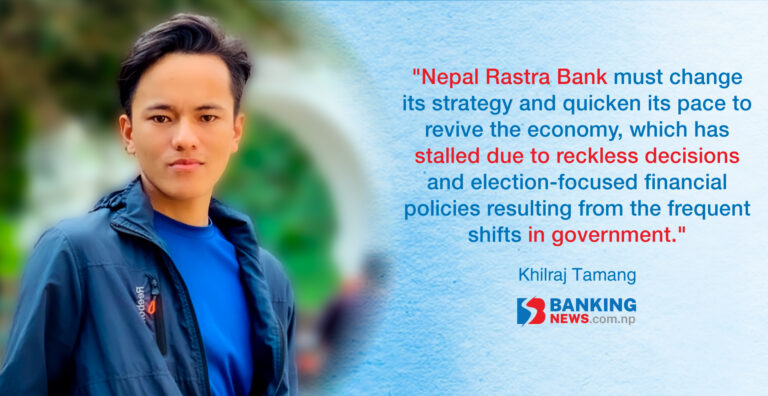Nepal Rastra Bank (NRB), the central bank of Nepal, serves as the financial advisor to the Government of Nepal, playing a vital regulatory role in managing the country’s monetary system. Established on 14 Baisakh 2013 under the ‘Nepal Rashtra Bank Act 2012’ and now operating under the ‘Nepal Rashtra Bank Act 2058,’ NRB formulates and implements monetary policies, issues and manages currency, and oversees money supply and foreign exchange management. As a self-governing, non-profit organization, NRB plays a crucial role in shaping and implementing Nepal’s economic policies.
At its inception, NRB was tasked with eliminating the dual currency system, displacing the Indian currency in favor of the Nepali rupee, stabilizing exchange rates, and fostering public confidence in the national currency. Today, the bank’s main objectives include creating and managing monetary and foreign exchange policies to ensure price and exchange rate stability, promoting financial access, and maintaining the stability of the banking and financial sectors.
One of the nation’s key challenges is to harness excess liquidity in the economy and channel it into productive sectors, thereby enhancing internal economic capacity. NRB must also address issues within savings and credit cooperatives, stabilize the economy through effective monetary policy, and curb unhealthy competition in the banking sector. Furthermore, it aims to expand banking services to rural areas, enhance financial literacy, and develop a cashless economy through digital payment systems.
In addition, NRB faces the task of controlling capital flight, regulating investments in hyper funds and cryptocurrencies, and managing inflation within specified limits. The bank must also work to sustain the current foreign exchange reserves, reduce the trade deficit, and strengthen Nepal’s external sector.
Despite these challenges, NRB has made significant efforts to stabilize the economy, especially in the wake of the COVID-19 pandemic and international economic pressures. The bank’s continuous policy updates and circulars have played a crucial role in accelerating economic recovery.
Looking forward, NRB must seize these challenges as opportunities, taking bold steps to enhance the efficient management of the monetary sector and address the nation’s macroeconomic issues. To achieve this, NRB should be granted full independence and autonomy, allowing it to formulate and implement policies free from political interference. The bank should also leverage artificial intelligence for the automatic inspection and regulation of banks and financial institutions.
Moreover, enhancing the skills and capacity of NRB employees through continuous training and development programs will further strengthen the central bank’s effectiveness. By adopting the latest technologies and tools, NRB can improve its operations and develop a robust ‘Nepal Rashtra Bank Research and Development Program.’ Lastly, to increase financial service access, NRB should implement special programs targeting rural areas and underprivileged groups, promote digital financial services, and encourage greater financial inclusion for all.
To promote Nepal’s macroeconomic objectives—such as external sector stability, job creation, inflation control, monetary sector regulation, and balanced economic growth—it is essential to regularly evaluate and analyze the effectiveness of monetary policy. Implementing clear and strict policies for the supervision and regulation of banks and financial institutions is crucial for controlling wrongdoing, ensuring honesty, and making productive use of financial resources.
Coordination between Nepal Rastra Bank and the government is necessary to develop a comprehensive risk management strategy for financial institutions, ensuring compliance and optimizing remittance flows and the productive use of foreign reserves to strengthen internal economic capacity.
For enhanced transparency and accountability, establishing an independent audit and monitoring system is vital. Regular reporting on financial policies and decisions will help maintain openness in the bank’s operations.
To increase access to financial services, targeted programs for rural areas and underprivileged groups should be implemented. Promoting digital financial services and encouraging financial inclusion are key to broadening access.
Maintaining exchange rate stability requires robust management of foreign exchange reserves and effective foreign exchange policies. Establishing strong coordination with the government, private sector, and international organizations is essential for achieving macroeconomic goals.
Continuous research and development, including the use of new technologies, should inform policy reforms and best practices. Empowering individuals with financial knowledge and enhancing financial behavior will also contribute to economic stability.
Ultimately, effective fiscal and monetary policies must work together, with the government playing a leading role to advance the economy in a balanced manner. Cooperative efforts between fiscal and monetary policies will address current economic challenges and foster positive internal economic activity.
(The views expressed above are the personal opinions of the author.)



 About Us
About Us
Comment